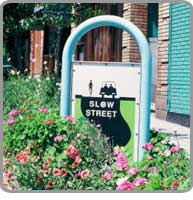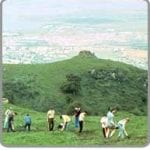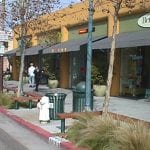Urban Ecology was founded in 1975 by visionary architects and activists who believed that cities should serve both people and nature. From the beginning, Urban Ecology has used urban planning, ecology, and public participation to help design and build healthier cities.
Urban Ecology’s mission is serious, but its roots are lighthearted and creative. In the mid 1970s, one of Urban Ecology’s founders, Richard Register, grew a vegetable patch in his 1968 Pontiac GTO to lampoon America’s love of cars. Dubbed the “Veggie Car,” it traveled to energy fairs, street festivals, and community gardens before it was finally retired to a playground. Around the same time, urban ecologists strapped on roller skates to distribute “Gasaholics Anonymous” parking tickets in Berkeley, inviting vehicle owners to question their dependence on automobiles and join in the fight to create cities built for people, not cars.
Freeing neighborhoods of excessive auto traffic has long been important to Urban Ecology. In 1985, Urban Ecology worked with Berkeley residents to create a plan for the Milvia “slow street,” which led to a redesign of the road to slow cars and create safer spaces for bicyclists, pedestrians, and residents. In 1998, Urban Ecology helped to lead the winning campaign to create groundbreaking new transportation policies at the Metropolitan Transportation Commission.
Urban Ecology’s mission has always involved local change within a global perspective. In 1990, Urban Ecology hosted the first international EcoCity conference. The event drew more than 800 people from 13 countries and initiated rigorous debates on ecosystems, alternative transportation, environmental justice, and urban design within modern cities.
In 1996, Urban Ecology published the Blueprint for a Sustainable Bay Area—a comprehensive publication that examines sustainability on multiple levels and offers specific recommendations for action. A winner of national and local awards, the Blueprint remains a guiding framework for Urban Ecology’s efforts.
Creating publications that explain complex urban issues is a hallmark of Urban Ecology’s work. For two decades, the organization published two newsletters, The Sustainable Activist and The Urban Ecologist, along with Urban Ecology magazine.
Urban Ecology continues to pursue its vision of creating vibrant neighborhoods by listening to communities, designing neighborhood plans to meet residents’ specific needs, advocating change, and serving as an information resource.
RecycleInfo.org – recycling tips!
HistoryBanter.com – history, humor, and pop culture articles.







